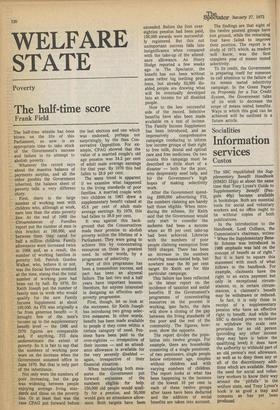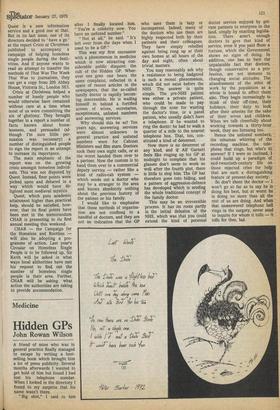Socialities
Information services custos
The SBC republished the Supplementary Benefit Handbook (HMSO 32ip) at about the same time that Tony Lynes's Guide to Supplementary Benefit (Pen guin 40p) became available in bookshops. Both are essential tools for social and voluntary workers and no office ought to be without copies of both publications.
In the introduction to the Handbook, Lord Collison, the Commission's chairman, writes: When the Supplementary Benefit Scheme was introduced in 1966 emphasis was laid on the concept of benefit as of right." But it is hard to square this statement with much of what follows in the handbook. For example, claimants have the right to an extra payment but only in exceptional circumstances, or, in certain circum stances, a claimant's benefit may be withdrawn or reduced. In fact, it is only those in receipt of a supplementary pension who have an effective right to benefit. And while the SBC is denied power to reduce or withdraw the scale rate provision for an old person (providing any other income they may have is below the qualifying level) it does have the authority to withhold part of an old person's rent allowance, as well as to deny them any or all of the discretionary addi tions which are available. Hence the need for social and volun tary workers to know their way around the ' pitfalls ' in the welfare state, and Tony Lynes's book is as good a map and compass as has yet been produced. Quest is a new information service and a good one at that. But in its last issue, one of its directors decided to 'have a go' at the report Crisis at Christmas published to accompany a campaign of helping homeless single people during the festivities. And if anyone wants to read an attempt to transfer the methods of That Was The Week That Was to journalism, they can get a copy from 209 Abbey House, Victoria St., London SE1. Crisis at Christmas helped a number of lonely people who would otherwise have remained without care at a time when most of us were committing the sin of gluttony. They brought together in a report a number of facts known about homelessness, and persuaded (although I'm sure little persuasion was necessary) a number of distinguished people to sign the report in an attempt to increase its importance.
The main emphasis of the report was on the growing crisis amongst homeless individuals. This was not disputed by Quest. Instead, finer points were picked upon and debated in a way which would have delighted most medieval mystics.
Quest, which puts academic attainment higher than practical help, should be satisfied, however, that its final points have been met in the memorandum CHAR is presenting to its first annual meeting this weekend.
CHAR — the Campaign for the Homeless and Rootless — will also be adopting a programme of action. Last year's Circular on Homeless Single People is to be followed up. Sir Keith will be asked in what ways local authorities have met his request to find out the number of homeless single people in their area. Further, CHAR will be asking what action the authorities are taking to provide accommodation. after I finally located him. "You're a celebrity now. You have an unlisted number."
" Not at all," he said. "It's left over from the days when I used to be a GP."
This was my first encounter with a phenomenon in medicine which is now attracting considerable public disquiet: the cult of the Hidden GP. Wherever one goes one hears the same complaint, reflected in a spate of recent articles in the newspapers, that the so-called family doctor is rapidly becoming inaccessible. He is walling himself in behind a fortified screen of wives, secretaries, receptionists, unlisted numbers and answering services.
Why should this be so? Ten years ago, answering services were almost unknown in general practice and unlisted numbers were for Cabinet Ministers and film stars. Doctors took their own night calls, or at the worst handed them over to a partner. Now the custom is to hand them over to a commercial deputy service — rather like a kind of radio-cab system — which sends out a doctor who may be a stranger to the area and knows absolutely nothing about the previous history of the patient or his family.
I would like to emphasise that these methods of organisa tion are not confined to a handful of doctors, and they are not an indication that the GP who uses them is lazy or incompetent. Indeed, many of the doctors who use them are highly respected both by their patients and their colleagues. They have simply rebelled against being rung up at their own homes at all hours of the day and night, often about trivial matters.
You may reasonably ask why a resistance to being badgered is such a recent phenomenon, which did not exist before the NHS. The answer is quite simple. The pre-NHS patient was either a private patient, who could be made to pay through the nose for wasting the doctor's time, or a panel patient, who usually didn't have a telephone. If he wanted to ring the doctor he had to walk a quarter of a mile to the nearest telephone box. That, too, constituted a kind of deterrent.
Now there is no deterrent of any kind, and if Alf Garnett feels like ringing up his GP at midnight to complain that his glasses don't seem to work so well after the fourth pint, there is little to stop him. The GP has therefore gone into hiding, and a pattern of aggression-defence has developed which is eroding the whole traditional concept of the family doctor.
This may be an irreversible process. It has its roots partly in the initial delusion of the NHS, which was that you could extend the kind of personal doctor service enjoyed by private patients to everyone in the land, simply by enacting legislation. There aren't enough doctors to give that kind of service, even if you paid them a fortune, which the Government shows no signs of doing. In addition, one has to face the unpalatable fact that doctors, though conservative as a pro fession, are not immune to changing social attitudes. The abandonment of the ethic of work by the population as a whole is bound to affect them also. They begin increasingly to think of their off-time, their holidays, their duty to look after their arteries for the sake of their wives and children. When we talk cheerfully about working towards a thirty-hour week, they are listening too.
Hence the unlisted numbers, the inhuman whirring of the recording machine, the tele phone that rings, but who's to answer? If I were so inclined, I could build up a paradigm of mid-twentieth-century life on those rejected cries for help that are such a distinguishing feature of present-day society.
So don't shoot the doctor — I won't go so far as to say he is doing his best, but at worst he is doing no more than all the rest of us are doing. And when that unanswered telephone bell rings in the surgery, never send to inquire for whom it tolls — it tolls for thee, lad.



































 Previous page
Previous page